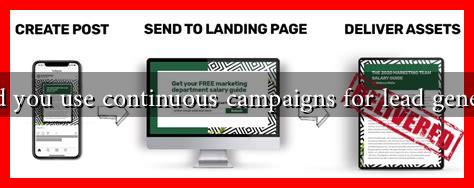-
Table of Contents
Should You Use Continuous Campaigns for Lead Generation?
In the fast-paced world of digital marketing, businesses are constantly seeking effective strategies to generate leads. One approach that has gained traction is the use of continuous campaigns. But what exactly are continuous campaigns, and should you consider implementing them for your lead generation efforts? In this article, we will explore the concept of continuous campaigns, their benefits, potential drawbacks, and provide insights to help you make an informed decision.
Understanding Continuous Campaigns
Continuous campaigns are marketing initiatives that run indefinitely, as opposed to traditional campaigns that have a defined start and end date. These campaigns are designed to maintain a consistent presence in the market, allowing businesses to engage with their audience over time. Continuous campaigns can take various forms, including:
- Email marketing sequences
- Social media advertising
- Content marketing efforts (blogs, videos, etc.)
- Webinars and online events
The primary goal of continuous campaigns is to nurture leads through ongoing engagement, ultimately guiding them through the sales funnel until they convert into customers.
Benefits of Continuous Campaigns
There are several compelling reasons to consider continuous campaigns for lead generation:
- Consistent Engagement: Continuous campaigns allow businesses to maintain a steady flow of communication with their audience. This consistent engagement helps build trust and keeps your brand top-of-mind.
- Improved Lead Nurturing: By providing valuable content and resources over time, you can nurture leads more effectively. This approach helps educate potential customers about your products or services, making them more likely to convert.
- Data-Driven Insights: Continuous campaigns generate ongoing data that can be analyzed to refine your marketing strategies. You can track engagement metrics, conversion rates, and customer feedback to optimize your efforts.
- Cost-Effectiveness: While continuous campaigns may require an initial investment, they can be more cost-effective in the long run. By building a loyal audience, you can reduce customer acquisition costs.
Challenges of Continuous Campaigns
Despite their advantages, continuous campaigns are not without challenges. Here are some potential drawbacks to consider:
- Content Fatigue: If your audience receives too much content without variation, they may become disengaged. It’s essential to keep your messaging fresh and relevant.
- Resource Intensive: Continuous campaigns require ongoing effort and resources. Businesses must be prepared to invest time and money into creating and distributing content.
- Measurement Difficulties: Tracking the effectiveness of continuous campaigns can be more complex than traditional campaigns. Marketers need to establish clear KPIs and metrics to evaluate success.
Case Studies: Success Stories of Continuous Campaigns
To illustrate the effectiveness of continuous campaigns, let’s look at a couple of case studies:
Case Study 1: HubSpot
HubSpot, a leading inbound marketing platform, utilizes continuous campaigns through their email marketing and content strategy. By providing valuable resources such as eBooks, webinars, and blog posts, they nurture leads over time. As a result, HubSpot has seen significant growth in their customer base and revenue.
Case Study 2: Mailchimp
Mailchimp employs continuous campaigns by sending personalized email sequences based on user behavior. This approach has led to higher engagement rates and improved conversion rates, demonstrating the power of ongoing communication.
Conclusion: Is a Continuous Campaign Right for You?
In conclusion, continuous campaigns can be a powerful tool for lead generation when executed effectively. They offer numerous benefits, including consistent engagement, improved lead nurturing, and valuable data insights. However, businesses must also be aware of the challenges, such as content fatigue and resource demands.
Ultimately, the decision to implement continuous campaigns should be based on your specific business goals, resources, and audience preferences. If you can commit to providing valuable content and maintaining engagement over time, continuous campaigns may be the key to unlocking your lead generation potential.
For more insights on lead generation strategies, consider exploring resources from HubSpot and Mailchimp.

